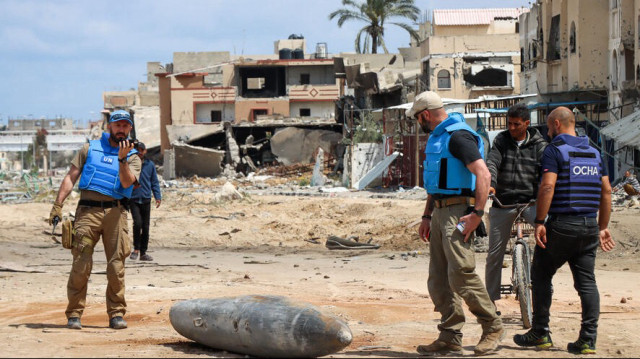
OCHA spokesperson Jens Laerke warns humanitarian workers are being killed in unprecedented numbers while funding collapses, leaving millions at risk
The people who bring food, medicine and hope to those trapped in war and disaster are themselves under siege as humanitarian workers are being killed in record numbers while the system that supports them is collapsing under historic funding shortfalls, the UN humanitarian office warned ahead of World Humanitarian Day.
Marked each year on Aug. 19, the day commemorates humanitarian staff who have been killed or injured in the line of duty and honors those who continue to deliver life-saving aid despite the risks. It was designated by the UN in 2008 in memory of the 2003 bombing of its headquarters in Baghdad, which killed 22 humanitarian workers, including the UN Special Representative to Iraq, Sergio Vieira de Mello.
“We are in a double attack. We are attacked in the field, where we implement our work, but we are also attacked in our back office, where we are supposed to get our funding, because funding has been cut,” Jens Laerke, a spokesperson for the Office for the Coordination of Humanitarian Affairs (OCHA), told Anadolu in an interview.
So far this year, humanitarian appeals have received 40% less funding compared with the same time last year.
“That is devastating,” he said. “Of course, we ask governments all over the world and other donors to step up, change their minds and try to find the money that goes into this life-saving work.”
Cuts also hit staff protection directly. Laerke stressed that protection is not only a matter of laws and accountability but also of basic safety measures such as vests, armored vehicles and helmets. Without sufficient funding, he warned, “that won’t be available for people.”
- 2024: Deadliest year on record
The financial crisis comes on top of an already devastating security situation. OCHA confirmed this week that 2024 was the deadliest year ever for aid workers, with 383 killed worldwide -- a 31% increase compared with 2023.
Most of those killed were national staff serving their own communities, attacked either in the line of duty or in their homes. In the same year, an additional 308 were wounded, 125 kidnapped and 45 detained.
The sharp rise in deaths was driven by conflicts in Gaza, where 181 humanitarian workers were killed, and in Sudan, where 60 lost their lives. Overall, violence against aid workers increased in 21 countries in 2024, with state actors identified as the most common perpetrators.
- ‘This cannot continue’
Laerke said the grim trend has become “a brutal, painful realization” for the humanitarian community, noting that attacks appear to be deliberate.
“Across the world, aid workers are being killed in record numbers. They are being injured in bomb attacks, shooting incidents…in record numbers. They are being detained by authorities without any proper reason as well,” he said.
“In Gaza, where local aid workers are trying to provide a lifeline to people and to keep children in school and to bring health care to people in clinics, they are being bombed and they are being killed as they try to do so,” he explained. “Sudan is another country that I want to point out also, where we see very courageous local aid workers being killed in record numbers, 60 of them last year alone.”
Laerke stressed that international law is clear: humanitarian staff must be protected. He said such killings are not only devastating for the people they are trying to help but are also “illegal” and “immoral.”
- Culture of impunity
Attacks on humanitarian workers, assets and operations violate international humanitarian law and undermine lifelines that sustain millions of people. Yet accountability remains elusive.
Laerke noted that international law already prohibits attacks on aid workers, yet impunity persists. He said OCHA continues to press for accountability and independent investigations, warning that when no one is charged or condemned, “it fuels further killing.”
The UN Security Council adopted resolution 2730 in May 2024, reaffirming the obligation on parties to conflict and member states to protect humanitarian personnel. It also called for independent investigations into violations. But implementation has lagged.
“The short answer is it's not enough. It's clearly not enough. The numbers tell their own story,” Laerke admitted regarding the efforts.
- A grim outlook
The first eight months of 2025 show no sign of a reversal. Provisional data from the Aid Worker Security Database already recorded 265 deaths as of mid-August. Laerke acknowledged that “not much has changed” since the last World Humanitarian Day, despite repeated warnings and appeals from the UN.
While he cannot predict what the rest of the year will bring, he said his hope is for a shift from rhetoric to accountability.
“Those countries, they know who they are, because you can look at the list where aid workers are being killed, and then look at which states are responsible for that territory, and those are the ones who need to act first,” he said.







